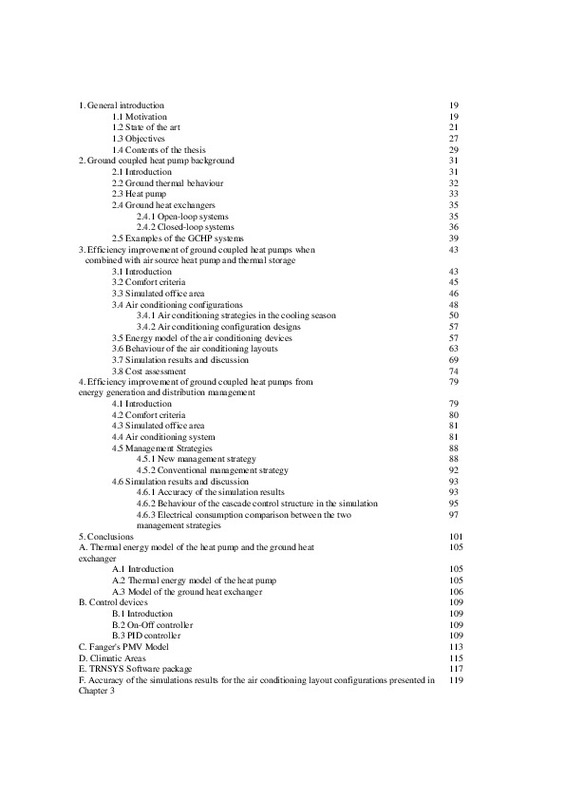- RiuNet repositorio UPV
- :
- Investigación
- :
- Tesis doctorales
- :
- Ver ítem
JavaScript is disabled for your browser. Some features of this site may not work without it.
Buscar en RiuNet
Listar
Mi cuenta
Estadísticas
Ayuda RiuNet
Admin. UPV
Energy efficiency improvement of hybrid ground coupled HVAC systems from thermal energy generation and storage management
Mostrar el registro sencillo del ítem
Ficheros en el ítem
| dc.contributor.advisor | Urchueguía Schölzel, Javier Fermín
|
es_ES |
| dc.contributor.advisor | Montero Reguera, Álvaro Enrique
|
es_ES |
| dc.contributor.advisor | Fernández De Córdoba Castella, Pedro Jos
|
es_ES |
| dc.contributor.author | Pardo García, Nicolás
|
es_ES |
| dc.date.accessioned | 2009-09-02T12:10:31Z | |
| dc.date.available | 2009-09-02T12:10:31Z | |
| dc.date.created | 2009-07-20T08:00:00Z | es_ES |
| dc.date.issued | 2009-09-02T12:10:20Z | es_ES |
| dc.identifier.uri | http://hdl.handle.net/10251/6065 | |
| dc.description.abstract | Nowadays, the increasing of the energy consumption is producing serious changes in the natural environment as the global warming. Around the 40% of all greenhouse gas emissions in developed countries come from the building equipments, where approximately 60% are produced by the air conditioning systems. In this context, ground coupled heat pumps are an attractive solution as air conditioning systems in commercial buildings due to their higher efficiency compared with the conventional air to water heat pump. In fact, the American Environmental Protection Agency recognizes ground coupled heat pump systems among the most efficient and comfortable systems available today. Nevertheless, the energy efficiency of the ground coupled heat pumps could be improve by means a properly management of the di erent equipments which form them. The objective of the research of this PhD thesis will be the development of management strategies in the air conditioning system based on the ground coupled heat pumps to improve its energy efficiency at the same time that we keep the thermal comfort in the conditioned areas. The energy management strategies will be oriented in the three ways: combining of several generation systems (ground coupled heat pump and air to water heat pump), decoupling thermal generation from thermal distribution (by means a thermal storage device) and strategies based on the management of the devices of the system (by means of continuous regulation of them). From the results of this research we can obtain two main conclusions. The rst one is that a properly management of a system composed by a thermal storage, an air to water heat pump and a ground coupled heat pump produce an improvement of the energy efficiency around a 40% respect to a conventional system and around a 18% respect to a geothermal system. The second main conclusion of this thesis is that a properly management strategy in continuous regulation of the devices which are part of a ground coupled .. | es_ES |
| dc.language | Inglés | es_ES |
| dc.publisher | Universitat Politècnica de València | es_ES |
| dc.rights | Reserva de todos los derechos | es_ES |
| dc.source | Riunet | |
| dc.subject | Energía | es_ES |
| dc.subject | Geotermia | es_ES |
| dc.subject | Eficiencia | es_ES |
| dc.subject | Gestión | es_ES |
| dc.subject | Hvac | es_ES |
| dc.subject | Almacenamiento | es_ES |
| dc.subject.classification | FISICA APLICADA | es_ES |
| dc.title | Energy efficiency improvement of hybrid ground coupled HVAC systems from thermal energy generation and storage management | |
| dc.type | Tesis doctoral | es_ES |
| dc.identifier.doi | 10.4995/Thesis/10251/6065 | es_ES |
| dc.rights.accessRights | Abierto | es_ES |
| dc.contributor.affiliation | Universitat Politècnica de València. Departamento de Física Aplicada - Departament de Física Aplicada | es_ES |
| dc.description.bibliographicCitation | Pardo García, N. (2009). Energy efficiency improvement of hybrid ground coupled HVAC systems from thermal energy generation and storage management [Tesis doctoral no publicada]. Universitat Politècnica de València. https://doi.org/10.4995/Thesis/10251/6065 | es_ES |
| dc.description.accrualMethod | Palancia | es_ES |
| dc.type.version | info:eu-repo/semantics/acceptedVersion | es_ES |
| dc.relation.tesis | 3117 | es_ES |
Este ítem aparece en la(s) siguiente(s) colección(ones)
-
Tesis doctorales [5188]







![Text file [Text]](/themes/UPV/images/text.png)


